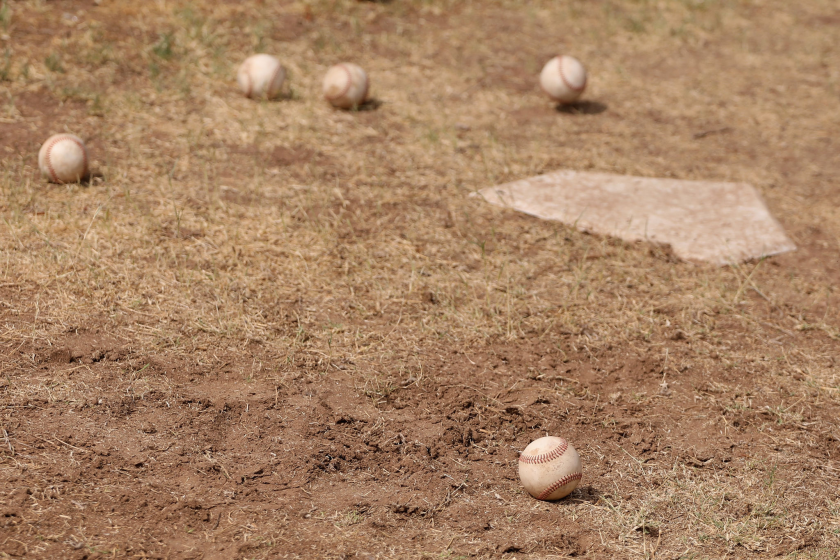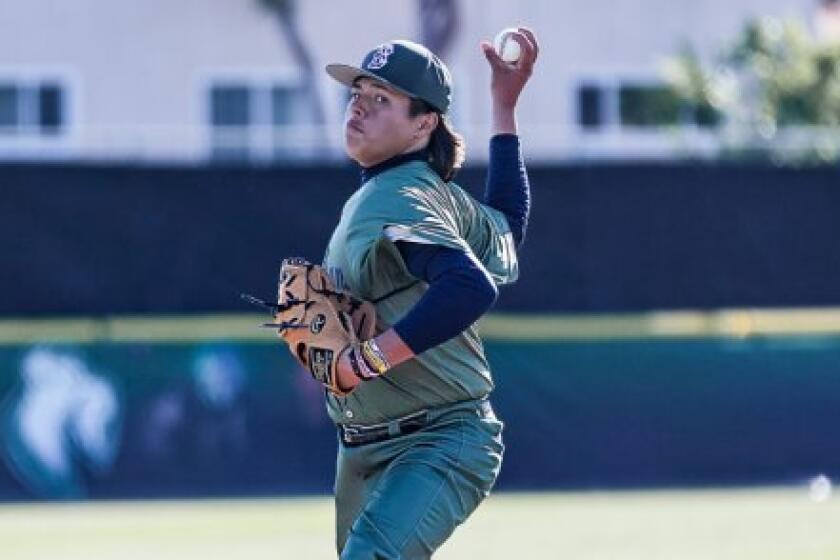Marist Loses Connection to NCAA Playoffs
- Share via
POUGHKEEPSIE, N.Y. — seemed little-known Marist College had found a way to reach college basketball’s promised land.
The Red Foxes rode the skills of three foreign-born players last season to a second straight NCAA tournament berth, and all three were due back in the starting lineup for another season.
Then, step by step, Coach Dave Magarity’s world began unraveling.
First, junior forward Peter Krasovec learned he could no longer delay a two-year military commitment to his native Hungary. Anticipating the move, Magarity had recruited five junior college players to replace Krasovec’s 9.6 points per game.
This summer, 6-foot-11 junior forward Miroslav Pecarski also left, opting to stay home in preparation for a tryout with the 1988 Yugoslavian Olympic team. The loss of Pecarski, who averaged 12.4 as a sophomore, was unexpected.
The final stroke that shattered Magarity’s dream came when the NCAA slapped Marist with a two-year ban from postseason play for a series of violations during the five-month coaching tenure of Mike Perry in 1984.
Magarity, who is in his second year as coach of the Red Foxes, could only roll his eyes when asked if he had become an expert in coping with adversity.
“Somebody up there must be devising all of these roadblocks,” he said.
Not all of the news out of Poughkeepsie is bad as Marist won three of its first four games, mainly because the best of the foreign trio, 7-4 center Rik Smits of the Netherlands, decided to spurn the NBA draft and stay for his senior year. When Smits made his intentions known, Marist was still considered the favorite in the ECAC Metro Conference.
But the Red Foxes, who had hoped to get past the first round of the NCAA tournament this season, have had to scale back their dreams.
Marist took a controversial approach to basketball success, using Perry’s European connections to recruit foreign players. The school was criticized for training the United States’ future Olympic competitors, and opposing fans showered players with green cards in at least one road game last year.
The school achieved the quick success it was looking for. But this year showed why such an approach is risky.
“You have to take a chance,” Magarity said. “Along with the possibility of getting a real diamond in the rough like Rik Smits, there’s always the possibility of losing a Krasovec or Pecarski. I can’t call up the Hungarian Embassy and say ‘What are you doing? You’re screwing up my season?’ ”
Marist’s position--in the shadow of the Big East and in an admittedly weak basketball conference--means he’s often left recruiting other teams’ leftovers if he can’t go the foreign route, Magarity said.
“I can’t even get in the door to talk to some 6-9, 6-10 kid here who can’t even carry Rik Smits’ sneakers,” he said.
Marist’s roster also includes Rudy Bourgarel of Guadeloupe and sophomore Curtis Celestine of Montreal.
Magarity bristles at those who suggest Marist’s approach is somehow unpatriotic.
“That’s an absolutely ridiculous position to take,” he said. “If my great-grandfather or your great-grandfather didn’t come here, we wouldn’t be here. What’s wrong with bringing a kid over for an experience like that? Are they hurting our game? I don’t think so.
“America’s always been a melting pot,” he said. “We’ve always had the philosophy that our door is always open.”
Magarity has problems with Marist’s other critic--the NCAA. He calls the two-year ban too harsh, suggesting the Red Foxes are being punished for their success. The school is appealing the probation.
The NCAA’s Committee on Infractions penalized Marist for a series of violations pertaining to the recruitment of foreign athletes. Marist coaches bought clothes, meals and airline transportation for foreign athletes on several occasions in 1984, according to the NCAA.
Perry was fired when he told school officials he intended to continue violating NCAA rules when he was confronted with them.
The problem increased when assistant coach Bogdan Jovicic allegedly lied about the violations to an NCAA investigator. Jovicic is still an assistant coach at Marist.
Magarity said the sanctions are already starting to hurt recruiting. It’s tough, he said, to recruit a player when he knows he has no chance to compete in the NCAA tournament as a freshman.
The sanctions also admittedly deflated this year’s team, although the players talk bravely of treating every regular season game as a big game and winning the regular season conference championship. Most likely, they’ll have to watch the conference tournament from the stands.
“The first week I heard about it, it took a lot out of me--knowing the feeling of going there twice and not being able to go again,” senior guard Drafton Davis said.
“Not only did it hurt us, it hurt the coach,” Davis said. “The one person I really feel for is Coach Magarity.”
This season’s highlights will have to be the ECAC Holiday Festival at the end of the month when Marist meets St. John’s in the opener, while Kansas meets Memphis State; and two games with Miami (Fla.), which will match Smits against 7-0 Tito Horford.
“Rik’s playing for his future,” Magarity said. “He’s playing for an NBA contract.”
Smits said he did not regret his decision not to apply for the NBA draft.
“Not so far,” he said. “I probably won’t. I made a choice to stay here and finish my education. The only time I had any second thoughts is when I saw the draft last year--I would have been one of the only big men out.”
Magarity’s got another goal. He doesn’t want to be seen as the coach who presided over the decline and fall of Marist’s basketball program.
“That’s my job here,” he said. “I’m not going to let that happen. I talk about it a lot with our players and in our recruiting, asking them to show the work ethic. I tell them I don’t want to be the coach--and you don’t want to be the players--on the team where people say, ‘Whatever happened to Marist?”’
More to Read
Go beyond the scoreboard
Get the latest on L.A.'s teams in the daily Sports Report newsletter.
You may occasionally receive promotional content from the Los Angeles Times.










